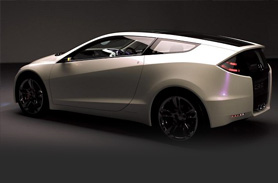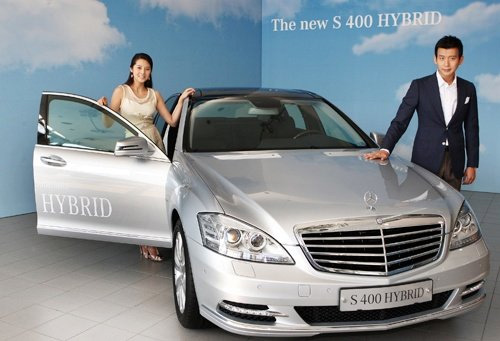 영어토론방 영어토론방 | Home>영어토론방 |
Technique Welcome to the new trend of hybrid car
페이지 정보

본문
 Daimler launches first German hybrid car
Daimler launches first German hybrid car The world's best-selling limousine, a favourite of world leaders, the Mercedes Benz S Class, is now available in Europe with two motors, one electric and the other petrol (gasoline), to save fuel and cut pollution.
The "CO2 champion of luxury cars," as Mercedes bills it, nonetheless cranks out 186-189 grams of carbon dioxide per kilometre, remaining one of the biggest polluters on the road, well above the European average of around 160 grams.
A comparable S model with a normal engine can spew out as much as 234 grams, Daimler counters.
A spokesman added that "we want to launch at least one hybrid model per year."
It is by all accounts a mini revolution in the German auto sector, which generally produces big, powerful cars by brands including Mercedes, Porsche, BMW and Audi.
Porsche plans to roll out a hybrid version of its Cayenne sports utility vehicle in late 2010, and BMW is preparing a saloon (sedan) from its Series 7 line this year, even though it is "too early to speak of full distribution," according to a BMW spokeswoman.
Auto expert Gerd Lottspiesen from the environmental association VCD told AFP that the German car industry "has been asleep for several years."
"It repeatedly dismissed hybrids. If it is finally waking up, it's pretty late" compared with Toyota, which sold its first hybrid Prius model in Europe nine years ago.
Lexus, the luxury line from Toyota, has offered a hybrid system for four years.
"For years, the German automobile sector did not believe hybrids had a chance ... but at a certain point, under market pressure, the industry changed its mind," said Stefan Bratzel, professor at a specialised auto centre in the western city of Bergisch Gladbach.
German companies mainly focused on diesel engines, the specialists noted.
As a result, the German market is dominated by diesels, while hybrids represented only 0.2 percent of the market last year with the sale of 6,500 Toyota, Lexus or Honda hybrids, according to national registration figures.
Since its launch, Toyota has sold 22,000 Prius in France and around 17,000 in Germany, which has a market three times bigger, according to Toyota data.
"The Prius has never been a best-seller here," a spokeswoman for the Japanese group acknowledged.
Germans, who are strongly attached to their national brands, could begin to switch over if domestic hybrid models are available however.
"The environmental trend is becoming dominant," said Frank Schwope, an auto analyst at the NordLB bank.
Daimler is a good example.
Until now it has been considered one of the most resistant to environmental trends.
But in the past few months, Daimler has begun to highlight its determination in the area.
It recently acquired a battery company and a 10 percent stake in the US electric car maker Tesla.
A sign for auto specialists that Germans could be at the leading edge of the next big step, fully electric automobiles.
Excerpt from AFP
Source: http://www.physorg.com/news165387006.html

Hybrid Car Sales Set to Boom in Near Future
Remaining largely unaffected from the economic recession, sales of hybrid vehicles is forecasted to grow at a CAGR of nearly 20% during 2009-2012, says RNCOS.
The year 2009 has so far been witnessing negative trend in the overall automobile sales, affected by the ongoing global economic crisis. Yet, hybrid cars have emerged as a highly lucrative segment, defying the current economic downturn, owing to the rising energy costs and stringent emissions regulations, says our new report, “Hybrid Car Market Forecast to 2012”. According to the report, governments of various countries have been offering promotional initiatives and legislative regulations that provide tax credits and concessions to users of environmental friendly vehicles, aimed at reduction of oil dependencies.
“Increasing levels of carbon emission has become the major concern for the governments worldwide that continue to force leading players such as Honda and Toyota to launch new hybrid models in the global markets,” says a Sr. Analyst at RNCOS.
However, one of the prime reasons for the low uptake of hybrid cars has been the high cost associated with these cars. But our research has found that with the increasing research and developments aimed at introduction of advanced hybrid technology and increasing production volumes, cost disparities between hybrids and conventional light vehicles will come down substantially during 2009-2012.
On the regional front, U.S. continue to dominate the hybrid sales volume; however, its share has been witnessing gradual decrease over the recent past as demand in other markets in Europe and Asia starts to strike-off, identifies the report.
Projecting global sales CAGR pegged at around 20% during 2009-2012, “Hybrid Car Market Forecast to 2012” provides extensive study and in-depth analysis on the primary markets for hybrid sales during 2009-2012. The growth projections are based on the rational analysis of the current as well as future developments across various key and emerging markets. The report reviews both the global and the national hybrid car markets, giving analytical and statistical information on those markets. Moreover, impact of global recession has been considered while making future projections. The comprehensive study will assist clients to capitalize on emerging opportunities in the worldwide hybrid car market.
Excerpt from PRMinds
Source: http://www.prminds.com/pressrelease.php?id=7858
댓글목록
등록된 댓글이 없습니다.

